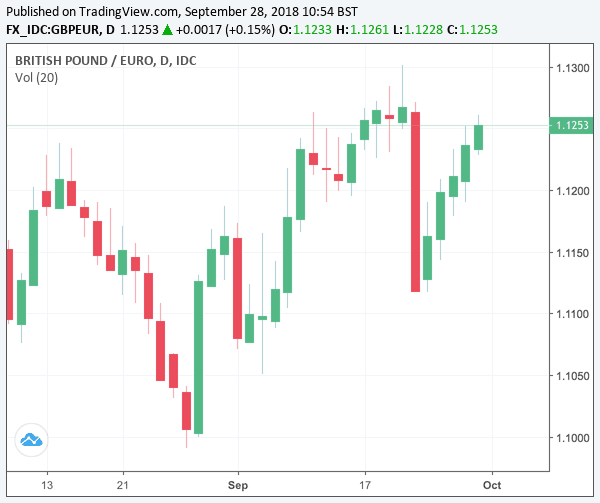Pound-to-Euro Exchange Rate Holds 1.12 Amidst Italian Budget Angst and Eurozone Inflation Miss

Image © Adobe Stock
- British Pound recovers majority of previous week's losses
- New Italian budget risks bloating country's debt pile
- Eurozone inflation data misses the mark
Pound Sterling enjoyed a 0.80% gain on the Euro in the final week of September amidst a lull in negative Brexit headlines and increased scrutiny on Eurozone political risks and data.
The Euro struggled ahead of the weekend amidst growing doubts Italy’s coalition government would manage to agree on a 2019 budget target; the angst saw a broad-based decline in the Euro exchange rate complex.
Further woes were heaped on the single currency after Eurozone inflation data disappointed against market expectations and suggests
At one stage the sell-off in the Euro allowed the Pound-to-Euro exchange rate to peak at 1.1257, levels last seen one week previously just before the Pound suffered a 1.0%+ slump on Prime Minister Theresa May's comments that Brexit negotiations had reached an impasse.
Italy’s government ultimately agreed late Thursday to set the 2019 budget deficit target at 2.4% of GDP and while this doesn't breach E.U. rules, markets and analysts alike are distinctly unimpressed by the outcome and eye a bloating of the country's already substantial debt pile.
The final target set by the coalition government was larger than that being promoted by Italy's technocratic finance minister Giovanni Tria who was aiming for a 2.0% target. There were concerns that the at times tense negotiations would see Tria resign, which in itself would have been a major red light for markets.
However, the 2.4% agreed by the coalition government ultimately remains within the 3.0% budget deficit target imposed by the E.U.’s Stability and Growth Pact.
There were fears that a breach of the E.U. rules would set Rome up for confrontation with Brussels which would ultimately raise political uncertainty in the bloc and hurt the Euro.
Markets have expressed some relief that confrontation has been avoided and the Italian-German 10-year government bond yield spread remains contained within its recent ranges.
"This suggests investor concern over Italian fiscal profligacy is muted. Consequently, we expect EUR to recover some of its recent losses," says Elias Haddad, Senior Currency Strategist with Commonwealth Bank of Australia.
However, Lee Hardman, a currency analyst with MUFG differs in opinion saying the final compromise suggests Tria succumbed to pressure "from the populist parties" to incorporate more stimulus to support growth.
The outcome still represents a material widening of the deficit compared to an expected deficit for this year of around 1.6% of GDP.
Hardman says the unfavourable budget outcome contributed towards yesterday’s sharp Euro sell off.
"The higher than expected deficit increases the likelihood that European officials will express dissatisfaction, although they will have to be wary of playing into the populist government’s agenda," says Hardman.
"Overall, it leaves the euro more vulnerable to the downside in the near-term although we are not convinced that any weakness will be sustained," adds the analyst.
Sterling Supported
On the Sterling side of the GBP/EUR equation, Haddad notes, "constructive comments by Bank of England Chief Economist Haldane offered GBP brief support overnight."
In an appearance at the Institute for Government think tank in London Haldane said the U.K.’s output gap is now close to being eliminated and more hikes would be needed if the economy continues to grow at the current pace.
Evidence that the output gap is closing is provided by latest official data showing growing wages amidst growing employment levels; in short the economy is running out of employees to fill the record-level of job vacancies on offer.
This in turn pushes up wages which in turn pushes up inflation which in turn forces the hand of the Bank of England to raise interest rates, and interest rate rises in turn boost the value of the Pound.
Despite the constructive state of the U.K. economy, "Brexit-related uncertainty remains the major factor weighing on GBP at the momentum," says Haddad, reminding us that any strength is ultimately likely to be capped by uncertainty.
The Pound's focus now turns to the Conservative party conference starting in Birmingham this weekend where delegates will be hoping to hone in on an unified Brexit stance.
However, the past two conferences have resulted in declines for Sterling; markets will be hoping conference 2018 snaps the trend.
Inflation Data to Set the Tone Today
The Euro came under further selling pressure ahead of the weekend after Eurostat reported Eurozone inflation stood at 2.1%. This was in line with analyst forecasts and should therefore be of no worry to the single-currency.
However, it was a miss on the core CPI inflation figure that got markets nervous that prices were headed in the opposite direction to that expected by the European Central Bank. Core CPI printed at 0.9%, substantially below the 1.1% forecast.
The European Central Bank is tasked with keeping inflation around the 2.0% marker, and expectations for a sustained pickup in inflation have lead the Bank to warn an interest rate rise is likely in Autumn 2019.
This expectation is a fundamental source of support for the Euro; remove it and the currency could struggle.
"Area data also served as a euro sell signal as core inflation unexpectedly slowed to 0.9% in September, a move further away from the ECB’s just below 2% goal. The data is seen as a setback to ECB hopes of a vigorous bounce back in inflation, a narrative that has supported the Euro," says Joe Manimbo, a foreign exchange strategist with Western Union.
Core inflation will need to put in some growth over coming months if the Euro is to avoid a rout.
"Unless there's a big turnarond in the Italy-EU relationship seems the Euro party is over for a while to come. How does the ECB maintain its party line when inflation is already moving in the wrong direction and it could soon be firefighting a run on Italian bonds?" asks our editor James Skinner.
Full analysis can be found here.
Advertisement
Lock in Sterling's current levels ahead of potential declines: Get up to 5% more foreign exchange for international payments by using a specialist provider to get closer to the real market rate and avoid the gaping spreads charged by your bank when providing currency. Learn more here





